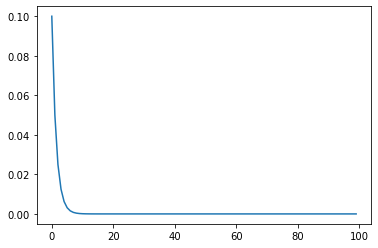torch.optim.lr_scheduler
pytorch提供了以下学习率调整的方式,转自pytorch官网
Prior to PyTorch 1.1.0, the learning rate scheduler was expected to be called before the optimizer’s update; 1.1.0 changed this behavior in a BC-breaking way. If you use the learning rate scheduler (calling scheduler.step()) before the optimizer’s update (calling optimizer.step()), this will skip the first value of the learning rate schedule. If you are unable to reproduce results after upgrading to PyTorch 1.1.0, please check if you are calling scheduler.step() at the wrong time.
暗示pytorch1.1.0版本以后,schedule.step()要在optimizer.step()之后
torch.optim.lr_scheduler.LambdaLR(optimizer, lr_lambda, last_epoch=-1)
Sets the learning rate of each parameter group to the initial lr times a given function. When last_epoch=-1, sets initial lr as lr.
Parameters
optimizer (Optimizer) – Wrapped optimizer.
lr_lambda (function or list) – A function which computes a multiplicative factor given an integer parameter epoch, or a list of such functions, one for each group in optimizer.param_groups.
last_epoch (int) – The index of last epoch. Default: -1.
Example
>>> # Assuming optimizer has two groups.
>>> lambda1 = lambda epoch: epoch // 30
>>> lambda2 = lambda epoch: 0.95 ** epoch
>>> scheduler = LambdaLR(optimizer, lr_lambda=[lambda1, lambda2])
>>> for epoch in range(100):
>>> train(...)
>>> validate(...)
>>> scheduler.step()
上面代码是每30个epoch学习率*0.95?不是这样的,看这个
应该是只能传入一个参数,计算的是一个与epoch相关的学习率乘数因子
lr = scheduler.get_lr()这个函数get√
自己测试下
from torch.optim import Adam, lr_scheduler
from torchvision import models
import matplotlib.pyplot as plt
lambda1 = lambda epoch:epoch // 10
lambda2 = lambda epoch:0.5**epoch
alexnet = models.alexnet(pretrained=True)
optim = Adam(params=alexnet.parameters(), lr=0.1)
scheduler = lr_scheduler.LambdaLR(optim, lr_lambda=lambda2)
x = list(range(100))
y = []
for i in range(100):
scheduler.step()
lr = scheduler.get_lr()
print(lr)
y.append(lr[0])
plt.plot(x, y)

torch.optim.lr_scheduler.StepLR(optimizer, step_size, gamma=0.1, last_epoch=-1)
Sets the learning rate of each parameter group to the initial lr decayed by gamma every step_size epochs. When last_epoch=-1, sets initial lr as lr.
Parameters
optimizer (Optimizer) – Wrapped optimizer.
step_size (int) – Period of learning rate decay.
gamma (float) – Multiplicative factor of learning rate decay. Default: 0.1.
last_epoch (int) – The index of last epoch. Default: -1.
Example
>>> # Assuming optimizer uses lr = 0.05 for all groups
>>> # lr = 0.05 if epoch < 30
>>> # lr = 0.005 if 30 <= epoch < 60
>>> # lr = 0.0005 if 60 <= epoch < 90
>>> # ...
>>> scheduler = StepLR(optimizer, step_size=30, gamma=0.1)
>>> for epoch in range(100):
>>> train(...)
>>> validate(...)
>>> scheduler.step()
这个比较好理解,每隔多少epoch学习率成比率下降
torch.optim.lr_scheduler.MultiStepLR(optimizer, milestones, gamma=0.1, last_epoch=-1)
Set the learning rate of each parameter group to the initial lr decayed by gamma once the number of epoch reaches one of the milestones. When last_epoch=-1, sets initial lr as lr.
Parameters
optimizer (Optimizer) – Wrapped optimizer.
milestones (list) – List of epoch indices. Must be increasing.
gamma (float) – Multiplicative factor of learning rate decay. Default: 0.1.
last_epoch (int) – The index of last epoch. Default: -1.
Example
>>> # Assuming optimizer uses lr = 0.05 for all groups
>>> # lr = 0.05 if epoch < 30
>>> # lr = 0.005 if 30 <= epoch < 80
>>> # lr = 0.0005 if epoch >= 80
>>> scheduler = MultiStepLR(optimizer, milestones=[30,80], gamma=0.1)
>>> for epoch in range(100):
>>> train(...)
>>> validate(...)
>>> scheduler.step()
和上面的差不多,这里是传入一个列表
torch.optim.lr_scheduler.ExponentialLR(optimizer, gamma, last_epoch=-1)
Set the learning rate of each parameter group to the initial lr decayed by gamma every epoch. When last_epoch=-1, sets initial lr as lr.
Parameters
optimizer (Optimizer) – Wrapped optimizer.
gamma (float) – Multiplicative factor of learning rate decay.
last_epoch (int) – The index of last epoch. Default: -1.
单纯的指数降低,是不是太快了0.0
torch.optim.lr_scheduler.CosineAnnealingLR(optimizer, T_max, eta_min=0, last_epoch=-1)

Parameters
optimizer (Optimizer) – Wrapped optimizer.
T_max (int) – Maximum number of iterations.
eta_min (float) – Minimum learning rate. Default: 0.
last_epoch (int) – The index of last epoch. Default: -1.
还有好多没看了,用到再看吧2333

-
torch.optim.lr_scheduler.ReduceLROnPlateau(optimizer, mode='min', factor=0.1, patience=10, verbose=False, threshold=0.0001, threshold_mode='rel', cooldown=0, min_lr=0, eps=1e-08) -
torch.optim.lr_scheduler.CyclicLR(optimizer, base_lr, max_lr, step_size_up=2000, step_size_down=None, mode='triangular', gamma=1.0, scale_fn=None, scale_mode='cycle', cycle_momentum=True, base_momentum=0.8, max_momentum=0.9, last_epoch=-1) -
torch.optim.lr_scheduler.OneCycleLR(optimizer, max_lr, total_steps=None, epochs=None, steps_per_epoch=None, pct_start=0.3, anneal_strategy='cos', cycle_momentum=True, base_momentum=0.85, max_momentum=0.95, div_factor=25.0, final_div_factor=10000.0, last_epoch=-1) -
torch.optim.lr_scheduler.CosineAnnealingWarmRestarts(optimizer, T_0, T_mult=1, eta_min=0, last_epoch=-1)
